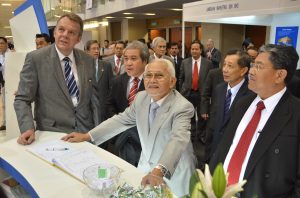Abdul Taib Mahmud, who ruled the East Malaysian state of Sarawak as a personal fiefdom for 33 years, delivered fantastic wealth to his family and a close-knit community of sycophants, has been laid to rest at a state funeral in Kuching following his death at the age of 87.
Known as Pak Uban or the “white haired uncle,” Taib announced his retirement as chief minister in March 2014, after amassing a fortune worth about $20 billion which at that time ranked his kin as the world’s fifth richest family, after the Walton family of Walmart fame.
As expected, hagiographers emerged from his home state following his February 21 death.
The Borneo Post carried the headline, “Remembering Sarawak’s Greatest Statesman,” and then quoted him as saying that the “politics of development is a holistic approach in balancing the whole spectrum of socioeconomic development.”
Hardly. Sarawak’s absolute poverty rates are among the worst in the country.
The Star quoted his last wife, 44-year-old Syrian-born socialite Raghad Kurdi, as saying: “No words can describe how much Taib meant to me,” after she took to social media to refute manic online claims that her husband had been abducted from a hospital.
But overall, Malaysian media outlets were unusually reserved in announcing his death. The official Bernama news agency noted national cabinet ministers had sent their condolences and Malaysiakini published an article under the headline, “Taib Mahmud, looking back at a senior leader’s checkered past.”
That was a veiled reference to the allegations – sometimes backed by overwhelming evidence – of gross corruption centered around illegal logging and dam construction in Sarawak, a state that was already blessed with substantial offshore oil and gas reserves.
Throughout his tenure Taib maintained a tight grip over the Christian-majority state within Muslim-majority Malaysia through malapportionment and gerrymandering, winning him a political fan club among the ruling elites in Kuala Lumpur.
His politicking ensured the ruling Barisan Nasional coalition, which had dominated Malaysian politics for decades after independence in 1957, maintained power at the national level.
Taib’s influence delivered 25 seats in the 2013 elections, ensuring then Prime Minister Najib Razak, who is now behind bars for corruption, kept his job. Najib and his wife Rosmah Mansor have also been tied to the murder of the Mongolian model Altantuya Shaariibuu.
Those political connections enabled Taib to establish a business reach via 400 companies across Sarawak and around the world with interests ranging from nine stock market listings and properties in the United States, Britain, Hong Kong, and Australia.
He was investigated by the Malaysian Anti-Corruption Commission (MACC), opposition politicians, the Tokyo Regional Tax Bureau, the Bruno Manser Fund (BMF), Global Witness, and the Sarawak Report among others. He escaped prosecution.
Some 55 non-governmental organizations took up a petition saying it would be a “national disaster” if Taib was made governor, or Yang Di-Pertua, of Sarawak following his 2014 retirement as chief minister. He was appointed governor and held that position until a month before his death.
But even in death his accounts are unlikely to be settled, at least not in the short term, amid reports that a family squabble is brewing with Taib’s children contesting Raghad for their father’s company shares through the courts.
The BMF says it wants those assets frozen and another probe launched into Taib’s bank accounts and other assets before they can be appropriated by his family.
“We call on the MACC to reopen its investigation into Taib assets, which was closed in 2016 for political reasons,” BMF Executive Director Lukas Straumann said in a statement.
“During Taib’s tenure, Sarawak lost most of its primary rainforests. In the 1960s, 90 percent of Sarawak was still covered with primary forests while today less than 10 percent remain intact,” he said.
Industrial logging was met with fierce resistance by indigenous communities and Straumann added that Taib acquired “enormous wealth,” despite constitutional prohibitions that are supposed to prevent the Sarawak chief minister and governor from becoming involved in commercial enterprises.
Given MACC’s success in prosecuting Najib – despite the recent reduction in his sentence – such a suggestion is more than worthy of consideration and the lawsuits likely to emerge from Taib’s offspring should offer additional insights into how the family of a Malaysian bureaucrat obtained so much money.

































